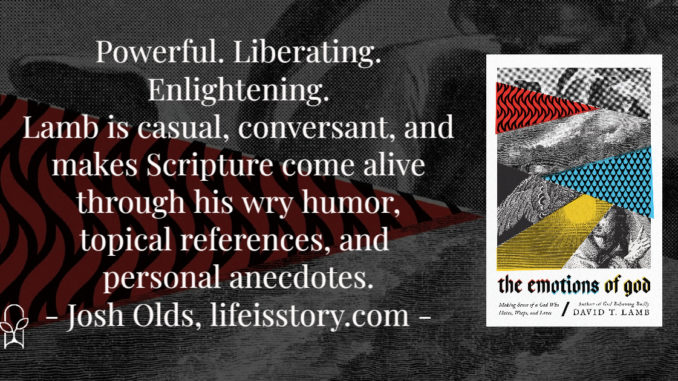
Also by this author: God Behaving Badly: Is the God of the Old Testament Angry, Sexist and Racist?
Published by IVP on November 22, 2022
Genres: Non-Fiction, Theology
Buy on Amazon
Goodreads

The God of the Bible is emotional. Many Christians don't want to associate emotions with God. Emotions feel irrational, and the idea of God experiencing hate, anger, and jealousy can be confusing and problematic. And yet the Bible is full of stories where God expresses deep emotion. Christians are often left wondering how to reconcile the tension of an all-powerful God expressing seemingly uncontrollable feelings. If God is hateful and angry at humanity, is he a God worth believing in?
In The Emotions of God, biblical scholar David Lamb examines seven divine emotions--hate, anger, jealousy, sorrow, joy, compassion, and love--and argues that it is not only good that God is emotional but also that we as his image-bearers can express emotions in such a way that reflects his goodness to the world. With discussion questions and suggestions for application, Lamb challenges his readers to journey with him into a rich study of the stories surrounding God's emotions so that we might better know God and reflect the beauty of emotion to the world.
There’s a Christian tradition that speaks of the impassibility of God. No, that doesn’t mean that you can’t go around God on the interstate. Impassibility means that God does not experience emotional change. Augustine, Luther, Calvin…Packer, Piper, Sproul. Traditionally (and in the Reformed tradition in particular), God’s impassibility is taken as part of orthodoxy. Jurgen Moltmann was the first theologian I read that argued the opposite: God must have emotions because it would be morally evil to not feel emotion in response to the world’s pain, suffering, and sin. God suffers alongside us, bleeds with us, dies, understands our pain.
In the past few decades, the passible God—the God of emotions—has become more in vogue as authors like Moltmann and John Stott have argued that God having emotions is what we see reflected in Scripture. Taking up that mantle, David T. Lamb offers us The Emotions of God: Making Sense of a God Who Hates, Weeps, and Loves. I absolutely love Lamb’s conversational humor and wit, all wrapped around a clear and cogent exploration of the topic. I find that the things I truly know are the things I can joke about and have a casual conversation about. There are a lot of topics I can speak on academically because I know them academically. But personal topics I speak about personally. That’s what David Lamb does here. The Emotions of God are something that Lamb understands not only academically but only practically and personally.
After an introductory chapter, The Emotions of God covers seven emotions: hate, wrath, jealousy, sorrow, joy, compassion, and love. (Note the movement from “negative” emotions to positive ones. Always good to end on a high note. Also, people are more interested in the negative emotions…particularly from an author whose previous book is God Behaving Badly). The intro chapter builds Lamb’s argument for a passionate God and muses on why we struggle to think of God in that way. Emotions seem irrational, uncontrollable, confusing. Feelings seem arbitrary, wild, and disordered. Not the way we want God to be.
But God is. The problem is that we project our own struggles with emotion onto God, and then proclaim that the answer is to shut down our own emotions. The Emotions of God not only presents God as a passionate figure in human history, it assures readers that having emotions is a godly thing and part of reflecting God’s image. To those who have been told that expressions of emotion are bad or even sinful, Lamb reflects on a God who is constantly expressing emotion throughout Scripture. And, I would say, teaching us how to wield emotion in a godly way.
The Emotions of God is a powerful, liberating, enlightening book. I laughed. I cried. It moved me, Bob. (To quote VeggieTales.) Lamb is casual, conversant, and makes Scripture come alive through his wry humor, topical references, and personal anecdotes. One of my favorite books of 2022.



